Finding an appropriate (and respectful) way to correct a person who has the wrong concept is something we should all learn. We are at a time when fake news is becoming more common and it is easy to think of certain data as correct. there is something truly complex, it is to combat this constant need that most of us must be “right. “
It is essential to assume that sometimes we make mistakes. This exercise in modesty is difficult, there is no doubt about it. While it’s hard enough to assume that making mistakes is human, it’s even harder to convince others that your ideas are wrong.
How can we do that without starting discussions?
You could say it’s a matter of tact, but it actually goes far beyond simple education or correction, you have to do it smartly, and in some cases you have to be prepared and be aware that we can be the bad guys.
After all, it is a question of creating a field of dialogue in which respectful but assertive communication flourishes, so that ideas circulate and arguments are appropriate.
Let’s see how to do that below
We all want to be right. Defending our truth is a virus present all over the world; we cling to our ideas with candles on the mast, like matches. Assuming that a mistake is, for many, a trace of weakness, and hardly anyone is glad that their argument or judgment is overturned.
It is very likely that we all had to correct someone who once had a bad idea, it is common for this to happen to people very close to us, this happens when, having lived the same experiences, everyone remembers it in a different way. way, and someone falls into so-called “false memories. “
Your partner, parent or best friend can have confusing dates or situations, so you try to convince them that it never happened like this. If you don’t do it carefully, you can start an argument.
Another example can be given in the professional sphere: who has never had to make a colleague see that what he said or did was not correct?
Most people have gone through situations like this and many would like to know how to deal with them more accurately. Let’s see how to do this below.
When correcting a person who has a false idea, it is not recommended to start with phrases like?You’re talking nonsense, aren’t you?With this, you can only put the person on the defensive before you even start.
Ideally, be skilful and closely expose your arguments, making the entry as positive as possible. Yes, it is true that we visited this city, and it is also true that we stayed in a very old hostel, in that I agree with you. But your brother wasn’t with us, because at the time he was still working on (?)?
When correcting someone, when reporting their mistake or their bad approach, it is very easy to use, almost instinctively, an authoritarian, ironic or accusatory tone, it is something that must be avoided.
The tone of your voice is as important as your arguments, so it’s critical to be close, empathetic and calm in communication.
When correcting a person it is not necessary to start by make it clear that we know the truth, after all a truth without arguments means nothing, because a fact without data to save him is like smoke escaping through a window.
Thus, to show the other (without imposing anything) and to show that you are right, it is necessary to propose solid arguments, for this it is necessary to communicate, give detailed and objective information in a clear way. , it is essential to be able to listen with empathy in order to respond adequately.
We won’t always be able to show each other and accept our mistake. So when it comes to correcting a person who has a bad idea, you have to understand that there are those who don’t want to see them differently.
This occurs, for example, in very complex cases, such as when someone is defending the anti-vaccine movement, or with Jehovah’s Witnesses and the problem of blood transfusions.
There are facts that we cannot understand and that happen every day because we are entering into issues of values, religions, fanaticisms and ideological misunderstandings that are very difficult to debate, to make those who make their false truth their unwavering shield to see their mistake is complex and exasperating.
In the face of these and other simpler situations (such as those related to erroneous memories), when the person tries to defend his position, we only have acceptance, whether we like it or not, we are obliged to live in a world in which, many times, everyone defends their false truth.
Whenever possible, we can try to debate with serenity, intelligence and security, but if we achieve nothing it is better to retire at the lowest possible emotional cost.

